Key takeaways:
- Choosing the right app development tools can enhance creativity and productivity, simplifying complex processes.
- Legacy frameworks provide stability, community support, and time-tested solutions, making them essential in modern development.
- Supporting legacy frameworks respects user relationships, strategically manages resources, and develops technical skills.
- The future of legacy framework support will involve hybrid solutions, community knowledge-sharing, and modernization alongside new technologies.

Understanding app development tools
When diving into app development tools, it’s fascinating to see how they can simplify complex processes. I remember the first time I stood in front of an IDE, overwhelmed by the myriad features. I wondered, how could such powerful tools be effective and still user-friendly? The intuitive interfaces and built-in features start to demystify coding, turning it into a more accessible craft.
Different tools serve various purposes, from prototyping to deployment. For instance, I’ve used Figma not just for design but to streamline my workflow and collaborate with others in real-time. Reflecting on those experiences, I realize that choosing the right tool can significantly enhance creativity and productivity, making me more efficient than I ever thought possible.
Moreover, the landscape of app development tools continuously evolves, which can be both exciting and daunting. Have you ever felt the pressure to keep up? I certainly have, especially when new frameworks appear, promising to make my projects easier or faster. But through trial and error, I learned that finding tools that truly resonate with my workflow can lead to a more enjoyable and rewarding development journey.
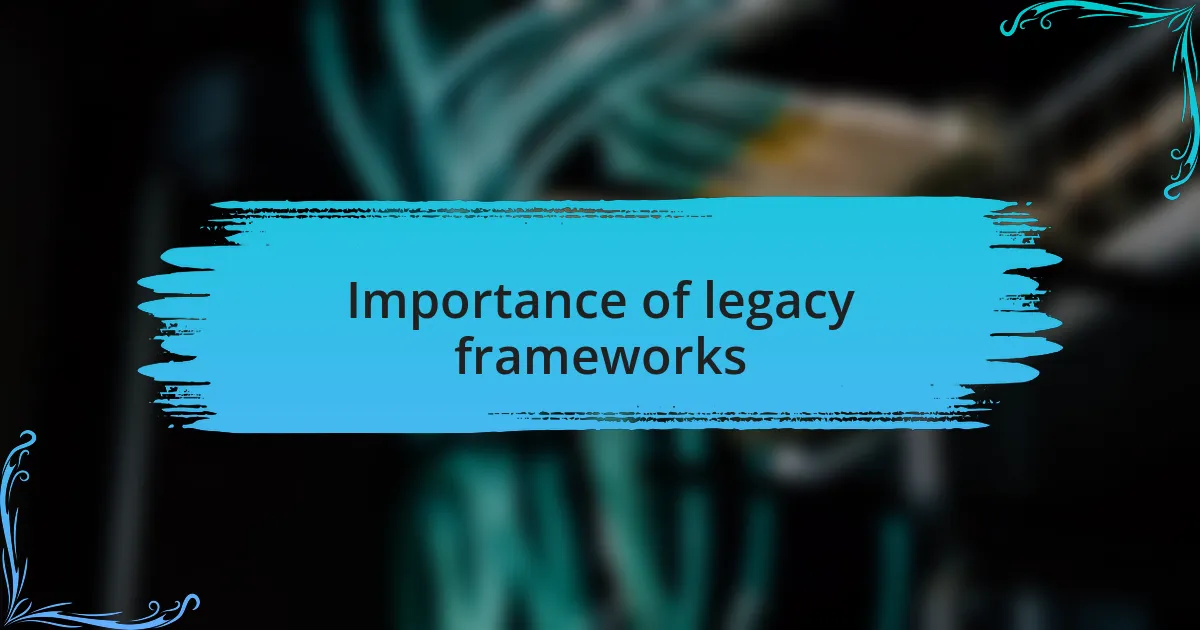
Importance of legacy frameworks
Legacy frameworks hold a unique significance in the realm of app development. They often serve as the backbone for many existing applications, providing stability and reliability that newer technologies might not yet offer. When I first worked with a legacy system, I felt a mix of frustration and admiration; navigating its complexities challenged my problem-solving skills, but it also deepened my understanding of the development lifecycle.
One of the most compelling reasons to value legacy frameworks is the robust community support they often enjoy. I remember connecting with seasoned developers on forums, sharing insights about maintaining older systems. Their willingness to help reminded me of the importance of knowledge-sharing in our field. Isn’t it reassuring to know that, even when working with dated technologies, you’re never truly alone in your journey?
Additionally, legacy frameworks frequently contain time-tested solutions to common problems, which can save developers both time and effort. I found myself relying on those pre-existing conventions when time was tight, often thinking, “Why reinvent the wheel?” It’s a stark reminder that sometimes, the best course of action is building upon established foundations instead of chasing the latest trends. This blend of nostalgia and practicality makes legacy frameworks essential in today’s fast-paced development environment.
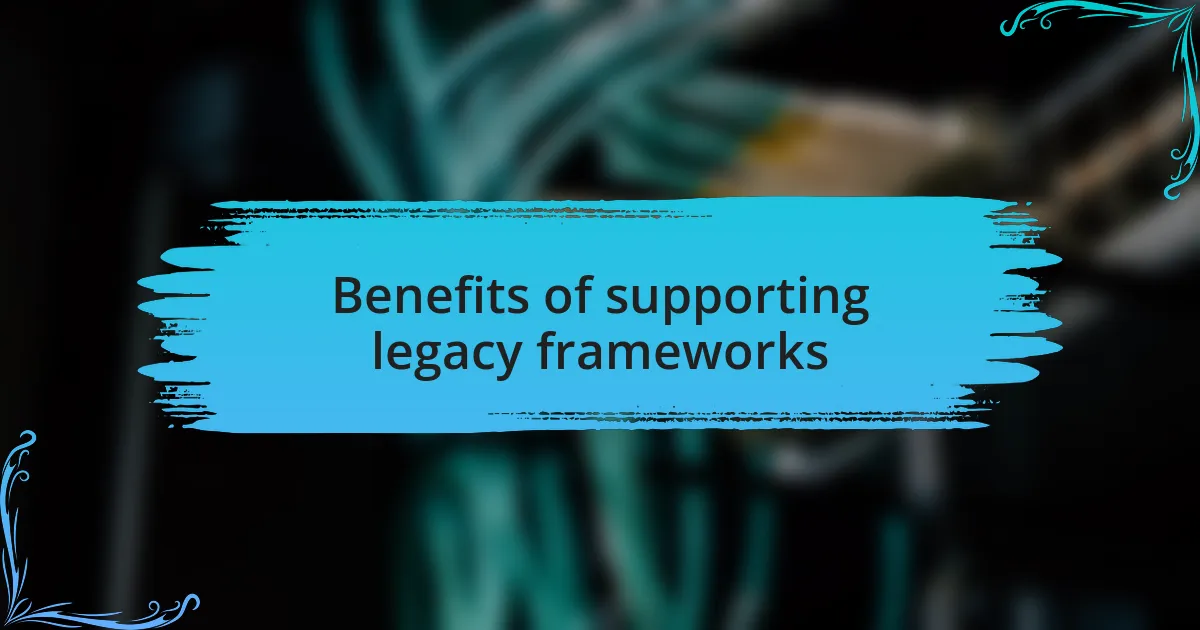
Benefits of supporting legacy frameworks
Supporting legacy frameworks offers several distinct advantages that are often overlooked. For one, they enable continuity in applications that users already trust. I recall a project where migrating to a newer framework seemed tempting but risked breaking changes that could alienate our user base. It made me realize how vital it is to respect the established relationships users have with these systems.
Moreover, embracing legacy frameworks can be a strategic choice for resource management. When I was involved in an organization with limited budgets, using well-supported legacy tools allowed us to allocate resources to other critical areas, like user experience enhancements. This taught me that sometimes the best investment is in maintaining what works beautifully rather than venturing into uncharted territory.
Lastly, I often find that working with legacy frameworks cultivates a deeper technical skill set. Each time I troubleshoot an older system, I gain insights that aren’t always applied in modern environments. Doesn’t it feel satisfying to decipher complex code and enhance your knowledge? This experience not only boosts my confidence but also underscores the value of versatility in my development toolkit.
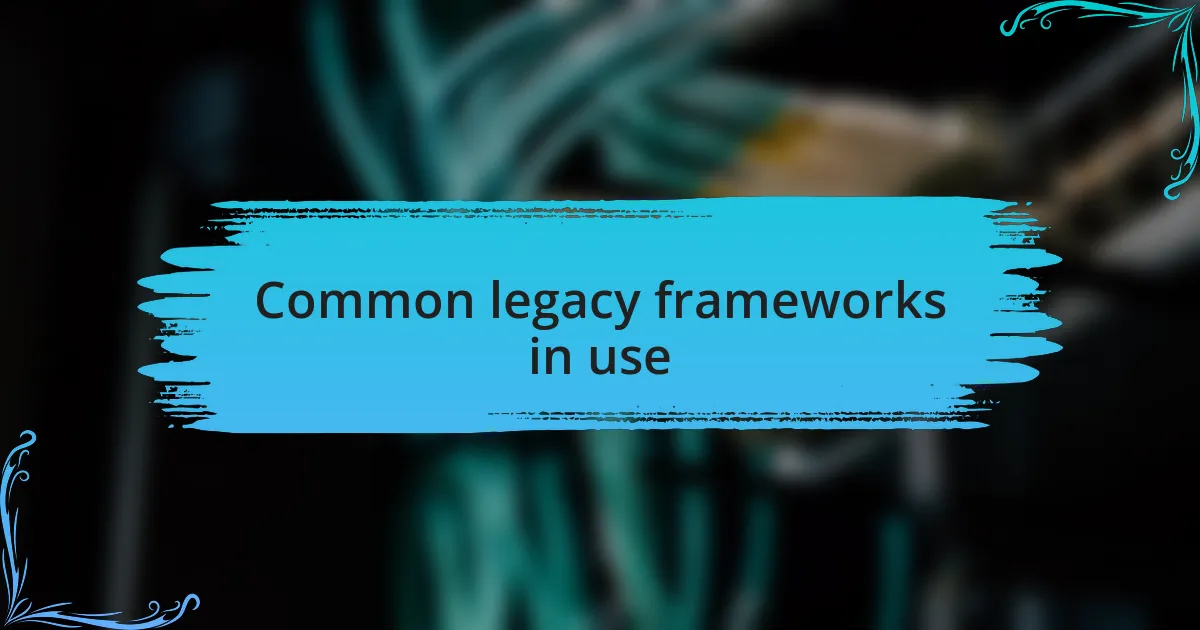
Common legacy frameworks in use
Common legacy frameworks in use often include stalwarts like jQuery, Classic ASP, and Ruby on Rails. I remember my early days as a developer, where I relied heavily on jQuery for its simplicity and ease of integration. Despite the emergence of countless modern libraries, it still holds a place in many projects, especially where rapid development is needed without reinventing the wheel.
Classic ASP evokes a mix of nostalgia and challenge for many developers. I once encountered a project where the client insisted on sticking with this framework due to its long-standing functionality. It was a struggle, as I had to wrap my head around its quirks, but through that experience, I learned to appreciate the foundational role it played in shaping modern web applications.
Ruby on Rails continues to be a prominent choice, especially for startups looking to kick off quickly. When I worked on a startup project, I was amazed at how quickly we could iterate on features. However, I also felt the weight of the legacy code as the business matured. It made me question—how do we balance the need for speed with the imperative for maintainability in evolving applications? This continual dance between legacy frameworks and modern demands keeps me engaged and always learning.
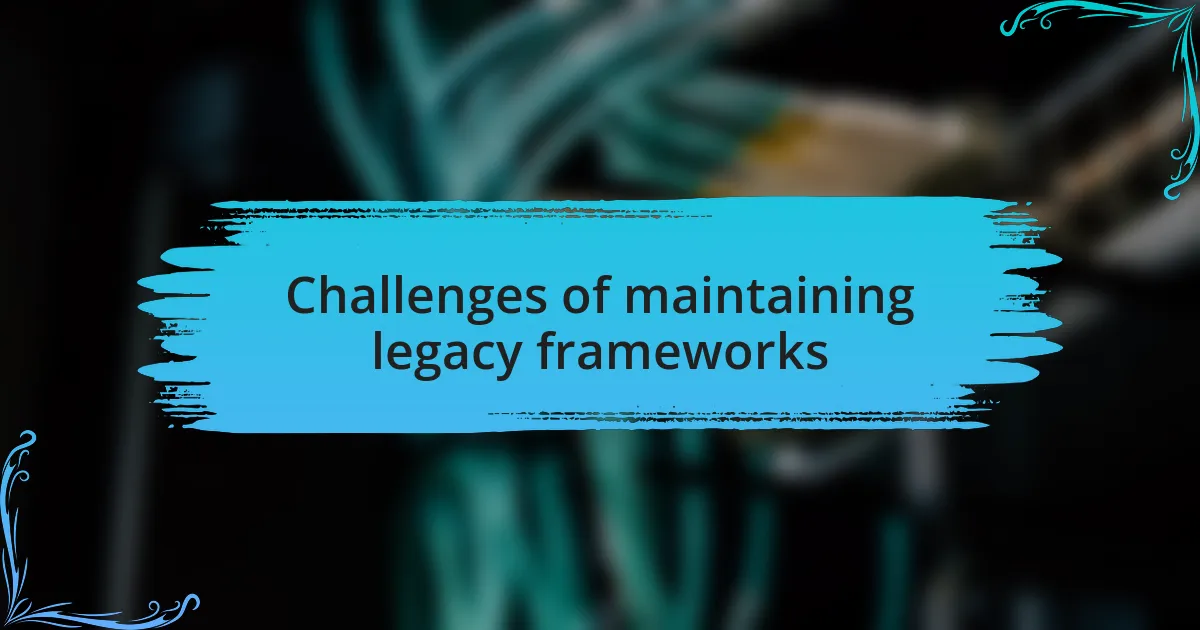
Challenges of maintaining legacy frameworks
Maintaining legacy frameworks often feels like managing a stubborn, old car that refuses to start when you need it most. I’ve faced moments when I had to dive into outdated documentation to troubleshoot issues, feeling the frustration of trying to understand code written years ago. It raises a pivotal question: How do you overcome the inertia of legacy systems while striving for innovation?
As I’ve navigated these challenges, I discovered that integrating new technologies with legacy frameworks can be like trying to fit a square peg into a round hole. One memorable project required us to add a modern API to a legacy system that was resistant to change. The integration process was fraught with compatibility issues, making me wonder—how can we innovate effectively when the foundation is so rigid?
Another hurdle I encountered was the knowledge gap within the team. Older frameworks often come with a steep learning curve, and newer developers may struggle to understand them. I recall a particularly stressful deadline when I had to mentor a junior developer on a Classic ASP project, recalling my own early frustrations. It made me realize the importance of codifying knowledge, so the wisdom gained doesn’t dissipate as teams evolve.
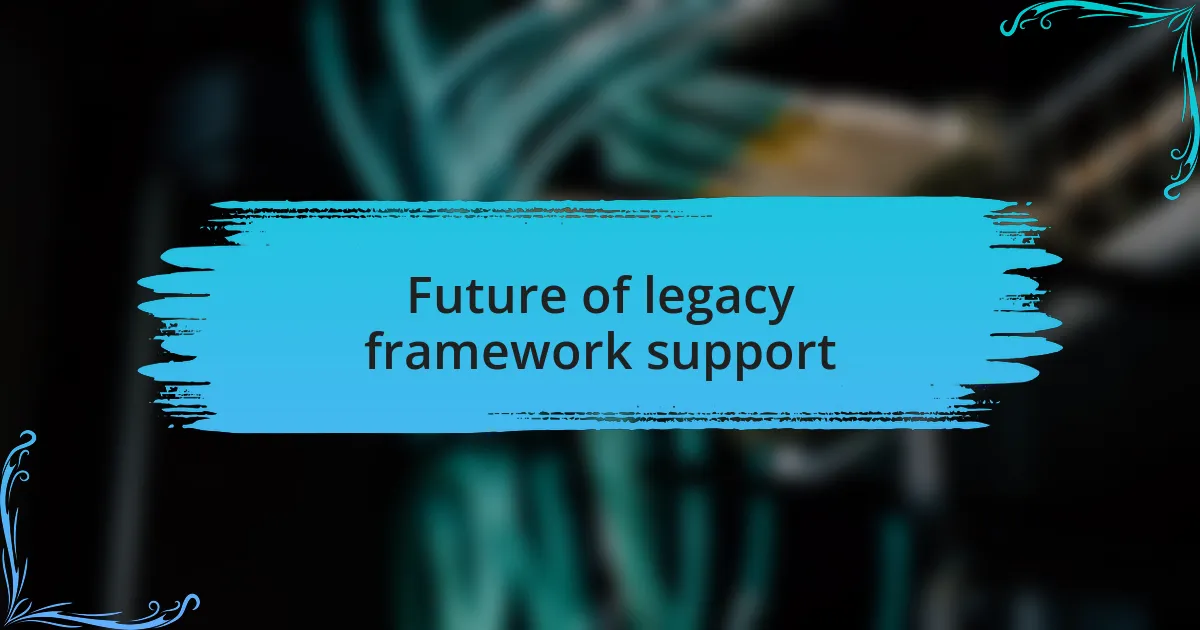
Future of legacy framework support
The future of legacy framework support is poised for a transformative shift, reflecting both the challenges and opportunities I see on the horizon. I’ve often pondered whether legacy frameworks will evolve alongside modern tech or become relics of the past. In my experience, organizations that prioritize modernization not only extend the life of these frameworks but also empower their teams with new skills and knowledge.
As I’ve observed, there’s a growing trend towards hybrid solutions that bridge the gap between legacy systems and contemporary applications. For instance, I once worked on a project where we chose to develop microservices that could communicate with an older framework, ensuring that we could leverage existing assets without being overwhelmed by them. I remember feeling a sense of relief as this approach allowed us to innovate while still providing the necessary support for essential legacy functions.
Looking ahead, I firmly believe that community support for legacy frameworks will continue to flourish, adapting as developers share their experiences and solutions. It’s heartening to see forums and online resources dedicated to preserving knowledge about older technologies. Is it just a fleeting trend, or are we witnessing a paradigm shift in how we treat legacy systems? From my perspective, investing in knowledge-sharing and documentation will be crucial in navigating this evolving landscape, ensuring that these frameworks are not just supported but also integrated into a larger vision of technological advancement.